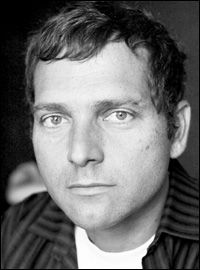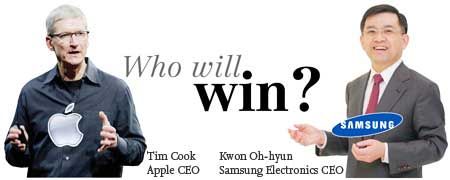Apple’s patent suit is ‘negotiation by other means’
Asymco’s Dediu predicts out-of-court settlement in Samsung dispute

Samsung Electronics has successfully switched its phone portfolio to smart devices making a commitment that Nokia couldn’t, according to a Harvard-educated analyst.
“Samsung went from having 3 percent to 50 percent in the smartphones’ portion in two years. This switch was very impressive and meant a commitment that even Nokia could not make,’’ analyst Horace Dediu said in an interview with The Korea Times, Monday. Dediu writes the influential Asymco blog.
One hidden reason that has boosted Samsung is that the firm has the capacity to produce the latest smartphones while Dediu pointed out it has spent $11 billion on advertising.
Dediu is a Romanian-American independent analyst and advisor to telecom incumbents and entrants to mobile platform strategy. He is the founder of Asymco and has an excellent track record of analyzing and exceeding predictive goals and objectives and has been a resource for major news outlets such as Bloomberg and Forbes.
Samsung is consistently saying that there is a “Chinese Wall’’ between its smartphone and component divisions, meaning classified details with its Apple business aren’t being shared between different sections. Apple complains that Samsung’s different divisions are sharing key details between themselves.
Samsung was the top handset maker by selling 1.03 million phones in the third quarter of this year, followed by Nokia and Apple with 82.9 million and 26.9 million respectively, according to data from the Boston-based market research firm Strategy Analytics (SA).
In a related note, UBS said Samsung could ship as many as 63 million smartphones in the last quarter of this year but depending on sell-through numbers with help from the Galaxy Note II and Galaxy S III, Samsung is expected to have a great quarter.
Dediu stressed that Apple feels betrayed by Samsung, causing the two to engage in their current global patent war.
“Apple has provided Samsung with a large number of orders over the years and didn’t expect the company to use their relationship to gain an advantage in the market Apple created,’’ Dediu said.
The analyst, who has an MBA from Harvard Business School and a Master of Science in engineering from Tufts University near Boston, Mass., continued: “The orders allowed Samsung to build its capacity to produce and generate a plan for new product development with a clear years-ahead view of where the opportunity in smartphones lies. Justified or not, I think that this is why Samsung and not HTC or other competitors was the target of most of Apple’s litigation.’’
The blogger declined to make any critical statements about the possibility of damage adjustment of what patent experts and industry executives say is a “controversial’’ ruling in California in August that awarded Apple a $1.05 billion victory by stressing that he doesn’t comment on matters of law and institutions related to law.
“As a business analyst, I consider litigation to be arbitrary and unpredictable and not something that should be used in formulating strategy,’’ he answered.
His remarks came a few days after Samsung filed a motion to amend its existing complaint at the United States District Court for the Northern District of California, San Jose, to include the recently-launched Apple iPad Mini, iPad 4 and the fifth-generation iPod Touch, as well as Apple’s latest iPhone 5.
The two companies are expected to meet on Dec. 6 in that court for a hearing with Judge Lucy Koh, who is presiding over the Samsung-Apple case. Samsung’s mobile chief Shin Jong-kyun has no plan to strike a peace treaty; though another Google Android ally, Taiwan’s HTC, recently announced a 10-year licensing agreement with Apple.
Dediu said litigation is negotiation by other means. “Every war was settled with a treaty. Every lawsuit is also always settled.’’
Apple: innovation killer?
Debates are ongoing to analyze the effects of the August verdict, which was a major blow for Samsung. Some applaud Apple for bringing the patent dispute to court and say it’s a very important case for anyone who has a great idea and wants to profit from their invention.
But others say Samsung’s victories in other courts will lead to more choice for consumers because more phone-making companies will be confident of selling alternative products with good pricing, leading to more consumer choices and lower prices all around.
In his closing argument on Aug. 21, Samsung’s top lawyer Charles Verhoeven claimed that Apple was seeking to thwart competition. Verhoeven later stressed consumers deserve a choice.
Apple’s lead counsel Harold McElhinny countered by saying people in Silicon Valley will continue to make investments as they know their technology will be protected.
On whether Apple is an innovation killer or not, Dediu just said: “No more than any other business. No more than any belligerent in war is a peace killer. There is no way to judge the use of litigation. As someone said, war is negotiation by other means. Litigation is negotiation by other means.
“Innovations vary infinitely in scale and scope. Litigation does not impede innovation but may cause innovation to change form or direction. Innovation is affected by many other forces: government regulation, market conditions, availability of talent, etc. But again, this is nothing new. Litigation was very popular in every industrial era. Aviation, radio and television, even firearms were the subject of bitter litigation for years. Those industries were still born and prospered. The outcome affected only who makes the profits.’’
He pointed out that the global technology industry will see more litigation as he personally thinks litigation itself is a very big market and opportunity. “Sometimes companies disagree. Commercial disputes are bound to happen.’’
In a final question on alleged claims that Samsung is a “copycat’’ company, Dediu responded, “It’s more subtle than copy of design.’’
Samsung has so far won two victories against Apple, one on its home turf of Korea and the other was a decision by a U.S. patent office that nullified Apple’s “bounceback’’ patent, which nine U.S. jurors had ordered the Korean firm to pay compensation for an infringement of it.
Courts in Europe, including the Netherlands, France, Italy and Germany have rejected claims by Samsung that Apple violated its wireless patents, with judges arguing that the patents have become industry standards.
Standard-essential patents are crucial technology for new players to make products compatible with the rest of the market and must be licensed under fair and reasonable terms.
Europe’s top anti-trust regulator had previously launched an investigation earlier this year into whether Samsung was failing to license those patents under fair and reasonable terms. <The Korea Times/Kim Yoo-chul, Cho Mu-hyun>





